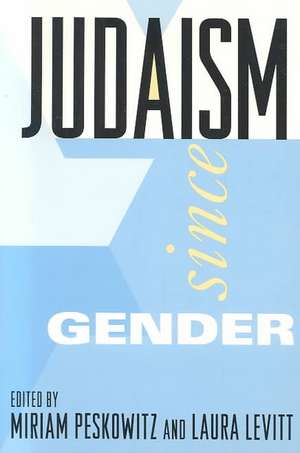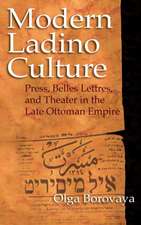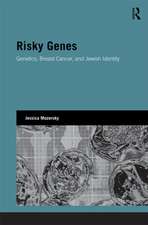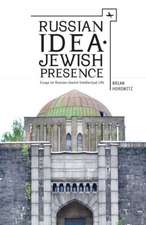Judaism Since Gender
Editat de Miriam Peskowitz, Laura Levitten Limba Engleză Paperback – 22 noi 1996
The question of how knowledge is gendered has been discussed by philosophers and feminists for years, yet is still new to many scholars of Judaism. Judaism Since Gender illuminates a crucial debate among intellectuals both within and outside the academy, and ultimately overturns the belief that scholars of Judaism are still largely oblivious of recent developments in the study of gender. Offering a range of provocations--Jewish men as sissies, Jesus as transvestite, the problem of eroticizing Holocaust narratives--this timely collection pits the joys of transgression against desires for cultural wholeness.
Preț: 369.61 lei
Nou
Puncte Express: 554
Preț estimativ în valută:
70.72€ • 77.06$ • 59.60£
70.72€ • 77.06$ • 59.60£
Carte tipărită la comandă
Livrare economică 23 aprilie-07 mai
Preluare comenzi: 021 569.72.76
Specificații
ISBN-13: 9780415914611
ISBN-10: 0415914612
Pagini: 242
Dimensiuni: 152 x 229 x 13 mm
Greutate: 0.45 kg
Ediția:New.
Editura: Taylor & Francis
Colecția Routledge
Locul publicării:Oxford, United Kingdom
ISBN-10: 0415914612
Pagini: 242
Dimensiuni: 152 x 229 x 13 mm
Greutate: 0.45 kg
Ediția:New.
Editura: Taylor & Francis
Colecția Routledge
Locul publicării:Oxford, United Kingdom
Notă biografică
Miriam Peskowitz is Assistant Professor of Religion at the University of Florida. Laura Levitt is Assistant Professor of Religion and Women's Studies at Temple University.
Recenzii
"...a valuable glimpse into the concerns of younger Jewish studies scholars, especially those interested in cultural studies. Many of the essays were intriguing..." -- Journal of American Ethnic History
"...scholars assess how gender studies has affected their work and their lives." -- Forward Books, January 31, 1997
"... explode[s] the myth that scholars of Judaism continue to be oblivious to recent developments in gender studies." -- Hurricane Alice
"...scholars assess how gender studies has affected their work and their lives." -- Forward Books, January 31, 1997
"... explode[s] the myth that scholars of Judaism continue to be oblivious to recent developments in gender studies." -- Hurricane Alice
Cuprins
Chapter 1 Editors’ Introduction: “A Way In”, Miriam Peskowitz, Laura Levitt; Part One Knowledges; Chapter 2 Engendering Jewish Religious History, Miriam Peskowitz; Chapter 3 Theorizing Jewish Patriarchy in extremis, Naomi Seidman; Chapter 4 Interarticulations: Gender, Race, and the Jewish Woman Question, Ann Pellegrini; Chapter 5 Words and Radiators, Irena Klepfisz; Chapter 6 When the Women Came to Shul, Karla Goldman; Chapter 7 Power / Knowledge / Gender: The Oranges-and-Grapefruit Debate, Tamar El-Or; Chapter 8 The Gender of the Angel, Jonathan Boyarin; Chapter 9 Other Tales: Museum Objects, Women, and Jewish Knowledges, Paula Chaiken; Chapter 10 American Jewish Culture Through a Gender-Tinted Lens, Riv-Ellen Prell; Chapter 11 Gender, Colonialism, and the Representation of Middle Eastern Jews, Joëlle Bahloul; Chapter 12 Boys of the Wissenschaft, Robert J. Baird; Chapter 13 Toward a Postzionist Discourse, Laurence J. Silberstein; Chapter 14 Finding a Language for Memories of the Future, Ammiel Alcalay; Chapter 15 On Seams and Seamlessness, Rebecca Alpert; Chapter 16 Notes from the Second Generation, Beth S. Wenger; Chapter 17 Teaching Jewish Studies, Ellen M. Umansky; Chapter 18 Rabbinic Judaism and the Creation of Woman, Judith R. Baskin; Chapter 19 Justify My Love, Daniel Boyarin; Chapter 20 Medievals Are Not Us, Kalman P. Bland; Part Two Studies; Chapter 21 A Jewess, More and/or Less, Amy-Jill Levine; Chapter 22 A Matter of Discipline: Reading for Gender in Jewish Philosophy, Susan E. Shapiro; Chapter 23 Circumcision and Jewish Women’s Identity: Rahel Levin Varnhagen’s Failed Assimilation, Jay Geller; Chapter 24 Jesus as Theological Transvestite, Susannah Heschel; Chapter 25 Mengele, the Gynecologist, and Other Stories of Women’s Survival, Sara R. Horowitz; Chapter 26 (The Problem with) Embraces, Laura Levitt;














